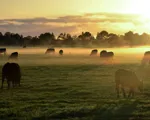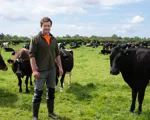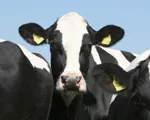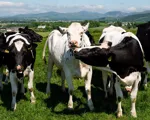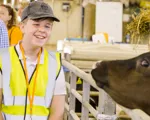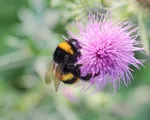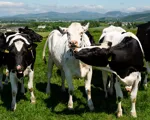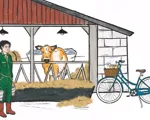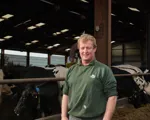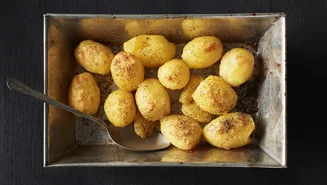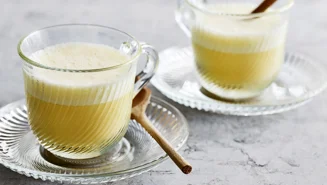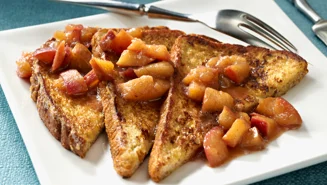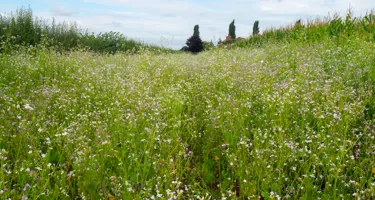
Our Bee Road initiative set out to help Britain’s bees and support our natural biodiversity. We wanted to help some of our most important pollinators to thrive and raise awareness of their vital role in our ecosystem. We’re delighted with the impact the initiative has had, but the side effect of success means that Britain’s hay fever sufferers could be worse off.
Arla and our more than 2,000 farmers are saying sorry to hay fever sufferers after our Bee Road initiative has led to an increase in bee-friendly planting, and so increasing pollen levels.
It’s estimated there are around 45 million people with hay fever in the UK, leading to many itchy eyes and runny noses during the summer months. However, we did some research into what people think about the potential increase in pollen and it turns out most people didn’t give a buzz. 89% of respondents to our survey said they’d be willing to put up with hay fever symptoms if it meant supporting the bee population and the country’s biodiversity.
In an even more selfless act, nearly three quarters of hay fever sufferers said they’d be willing to plant more flowers in their gardens to support bees. It’s heart-warming to see how much people care about supporting our biodiversity and protecting nature, even if it means putting up with annoying symptoms.
Bugging our homes
Since our Bee Road initiative launched in 2021, we’ve had some great feedback and seen a lot of action from the public. As well as 63% of people saying hay fever is ‘worth it’ for nature, 67% of non-hay fever sufferers agreed that we need to be doing our part for nature even it makes life a little more difficult.
One of the ways people are doing this is by creating more habitats for wildlife in our gardens and outdoor spaces. Over a quarter of our respondents took part in ‘no mow May’ in 2022, and over half said they would be happy to start letting their lawns grow wild. Leaving your lawn to do its own thing helps to encourage wild flowers to grow, which in turn attracts a wider variety of insects and other animals.
People have also been finding other ways to attract nature into their gardens, including adding bug hotels, bird feeders, and bee pollinators. 1 in 5 have even been leaving logs out to rot, encouraging creatures such as stag beetles to move in and make a home.
While this is all fantastic and will be a big help to Britain’s bugs and wildlife, attracting more creepy crawlies into our lives can be less than ideal in some situations. 1 in 5 bravely said they’d put up with more insects flying around their BBQs, or worms near their picnics, or even an increase in bird poo if it meant helping the planet in the long run. Just as with hay fever, it’s one of those things that can make life a little more difficult, but it’s important to keep sight of the bigger picture.
Connected to nature
All this education around how to support nature and the importance of bees and other pollinators has helped people connect these processes with the foods we eat. At Arla we’re all about helping to connect what we put on our tables with the land and the animals that produced it. After all, we can’t do what we do without nature so we’re always looking at how we can protect and support it through our dairy farming practices.
Our research highlighted that around a third of people aren’t aware of the crucial role farmers play in supporting biodiversity, and 20% didn’t know how important bees are to our ecosystems. This shows us there’s still work to be done, but that’s why we’ll keep coming up with projects like Bee Road, and why we’re so thrilled to see people getting involved all over the country.
Join the Bee Road
If you’ve been inspired to get involved, here are some tips and tricks from one of our Arla Farmers on how you can help support biodiversity and join the Bee Road:
- Plant more species, particularly those that attract bees and other pollinating insects. You don’t need to have a garden for this. You can recycle yoghurt pots to make your very own pollinator pots even if you only have a windowsill to offer!
- If you see a Bee struggling, try giving it a bit of sugary water and moving it out of harm's way whilst it recovers.
- Choose a small area of your garden and let it ‘grow wild’ or just leave a patch of fallen leaves. Insects, birds, and small mammals will benefit from the cover and native plants.
- Put up a bird feeder or nest box. This doesn’t need to be in a garden, some birds will come to a feeder on a balcony, or front porch and large windowsill.
- Create a bug hotel for insects to use over winter, or put a bat box or hedgehog house out for creatures
- If you have a driveway for your car to park – consider making it a green driveway without the concrete
- Stop using pesticides or herbicides and swap them for organic products.
- Leave a pile of logs out for small creatures like stag beetles to house in.
- Get children involved in the activities! Inspiring future generations to love and respect wildlife is so important for the long-term health of our natural systems.
Find out more about the Bee Road


